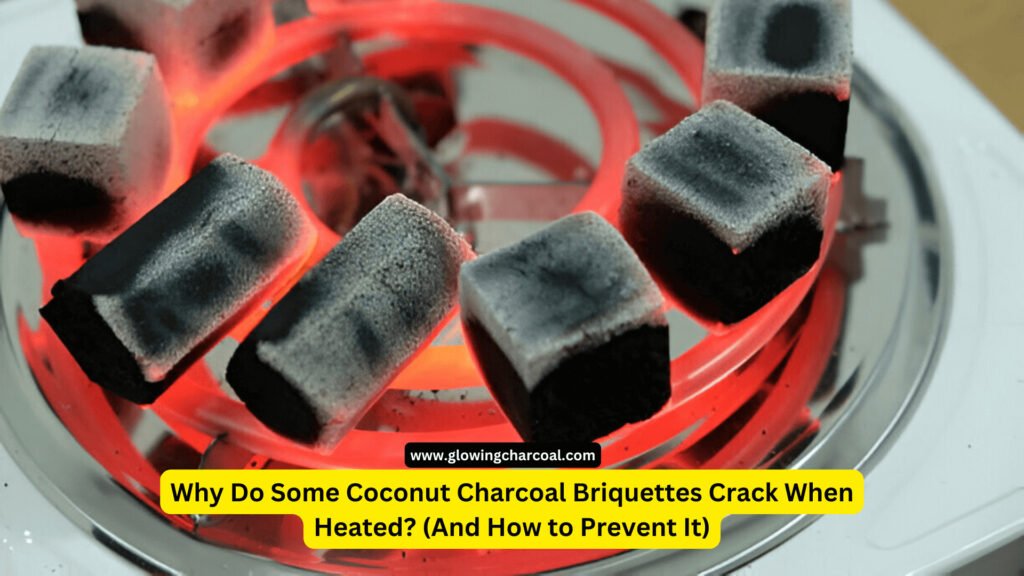Why Do Some Coconut Charcoal Briquettes Crack When Heated? (And How to Prevent It)

Coconut charcoal briquettes are a favorite among shisha enthusiasts and BBQ lovers due to their clean burn, long-lasting heat, and eco-friendly nature. However, one common issue that many users experience is cracking during ignition. If you’ve ever seen your briquettes break apart under heat, you’re not alone. But why does this happen, and how can you prevent it? Let’s dive deep into the reasons and solutions for this frustrating issue.
Why Do Coconut Charcoal Briquettes Crack?
1. High Moisture Content
One of the biggest culprits behind cracking is excess moisture. If the briquettes are not dried properly during production, the remaining water inside expands rapidly when exposed to heat, causing them to break apart.
Solution:
Ensure that the briquettes are thoroughly dried during the manufacturing process.
Store charcoal in a dry place to prevent moisture absorption.
2. Poor Binder Quality or Incorrect Ratio
Coconut charcoal briquettes rely on natural binders, such as tapioca starch, to hold them together. If the binder quality is poor or the ratio is incorrect, the briquettes will have weak structural integrity, making them prone to cracking under heat.
Solution:
Use high-quality natural binders in the right proportion.
Work with experienced manufacturers who understand the optimal binder-to-charcoal ratio.
3. Rapid Ignition with High-Pressure Blowtorches
Some users ignite charcoal quickly using high-pressure blowers or direct flames. While this speeds up the process, it can also cause thermal shock, leading to cracking.
Solution:
Use a gradual heating process instead of direct, extreme heat.
Invest in high-density briquettes that are designed to withstand high heat pressure.
4. Low Carbonization Temperature
If coconut shells are not carbonized at the right temperature, they can retain volatile compounds that weaken the structure of the final briquette. When heated, these trapped gases can expand and cause the briquette to break.
Solution:
Ensure proper carbonization at 600-800°C to remove unwanted gases and enhance strength.
Work with suppliers who follow strict carbonization processes.
5. Uneven Particle Size in the Charcoal Mix
The consistency of the charcoal powder used in briquettes matters. If there is a mix of fine and coarse particles, the density may be uneven, creating weak points in the briquette that can lead to cracking.
Solution:
Use a uniform particle size in the briquette mixture.
Invest in advanced processing equipment to ensure consistency.
How to Choose Crack-Resistant Coconut Charcoal Briquettes
If you want to avoid dealing with cracked charcoal, look for these key qualities when purchasing briquettes:
High Density: Well-compressed and properly cured briquettes last longer and resist cracking.
Low Moisture Content: The best briquettes have a moisture content below 5%.
Proper Carbonization: Ensures a high fixed carbon content (above 80%) for durability.
High-Quality Binding Agents: Ensures strong cohesion without excess smoke or odor.
Glowing Charcoal Indonesia: Your Source for Crack-Free Coconut Charcoal
At Glowing Charcoal Indonesia, we take pride in producing premium coconut charcoal briquettes that are engineered to withstand extreme heat without cracking. Through a precise production process, we ensure low moisture content, high density, and superior carbonization, making our charcoal the best choice for shisha and BBQ enthusiasts. Contact us today to get the best quality coconut charcoal for your business!
Looking for trusted shisha charcoal factory in Indonesia?
Contact us to discuss further:
WhatsApp: +62-812-8400-6660
Email: info@glowingcharcoal.com
